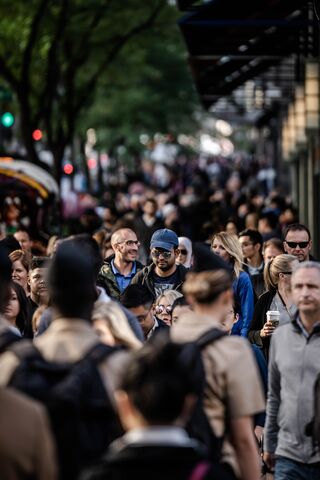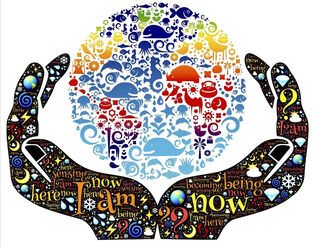Who Am I, Who Are We?
How do children and teens come to understand who they can become?
Posted Nov 24, 2020
How we construct and understand who we are shapes how we interact with each other, how we parent our children, what we teach and how we educate them, and the kinds of laws and policies we enact. From this view, identity scholars can begin to imagine the ways that we can leverage identity to shift who we are becoming in the direction of a more equitable and humane society.[1]

A crowded streetSource: Cameron Casey/Pexels
Who am I? It is a universal question; a question shared by humans across the globe, one we’ve all asked ourselves in some form or another. As a developmental psychologist, I am primarily interested in how children and teens come to understand who they are and can become. When do they begin thinking about the self and its social significance? How do they go about answering this question? What kinds of events, experiences, relationships, and contexts influence their answer?
Among developmental psychologists, Erik Erikson is considered the godfather of identity theory. He devised the Eight Stages of Man [sic], articulating how humans form a clear, meaningful, and generative sense of who they are across the life course. Erikson’s theory about the development of self was simultaneously a theory about society. Identity, he wrote, is “a process ‘located’ in the core of the individual and yet also in the core of his [sic] communal culture.”[2]
In my research, I conduct interviews, one-on-one research-based conversations, with young people from diverse racial and ethnic backgrounds about who they are, who they aren’t, and who they want to become, what is important to them and how they understand what society expects of them. I’ve interviewed and listened to close to a thousand young people over the past decade and each of their stories reveals a lot about their individual experiences and specific identities, their challenges and resilience, but collectively their stories reveal a story about who we are as a society.
The following quote is an excerpt from an interview with Devin, a 14-year-old Black boy who participated in one of my studies about identity. We were part way through the interview, discussing various aspects of his developing identity and how he sees himself. I asked him about his racial background, specifically his understanding of being Black in America.
Onnie: What are some of the good things about being Black, things you like about it?
Devin: I’m just glad to be Black you know, even though there’s like a lot of stereotypes… Like, Black men really don’t like to grow up, either they’re like drug dealers or gang bangers, or end up dead or something like that, or end up in jail. No, since I’m Black I feel like I gotta, you know, achieve somethin’ other than that, you know? I’ve got goals to do.

A portrait of a Black boySource: Penda Kamati/Pexels
Devin likes being Black. It is an important and positive part of his identity, which research shows will support positive developmental outcomes, like his academic aspirations, achievement, and wellbeing.[3] Identity is the foundation for healthy and productive ways of being in the world. But more than his individual sense of identity, Devin, like so many of the adolescents I have interviewed over the years, situates his identity in the societal context in which we live: “I’m just glad to be Black you know, even though there’s like a lot of stereotypes.” For young people, particularly those who are from systemically marginalized and minoritized social groups, forming a positive view of who they are that counters society’s negative stereotypes, is psychosocial resource, an inner strength that can offset societal harm.
Devin’s response also shows us why and how identity matters for the kinds of pathways young people travel. Devin responds to a question about what he likes about being Black with an explicit and spontaneous reference to his future, his goals and aspirations of who he wants to be. He also expresses a fear of becoming “nothing” – of not being or doing anything of value or significance to society (drugs, gangs, in jail, dead). Society has created a story about young people like Devin and he knows the story well: the story is that he, by virtue of his being Black and male in America, lacks the capacity to become anything of value or to contribute to society.
Yet, the human being’s desire to “be”, to form a clear and meaningful sense of self in the world is persistent. Philosophers, theologians, and scholars across disciplines have written for centuries about the human yearning for a life with purpose and meaning.[4][5][6][7] Devin’s response reminds us that growing up in a society defined by structural oppression and dehumanizing stereotypes threatens this basic human need. As a result, young people must contend with being told, implicitly and explicitly, by the prevailing ideologies of white supremacy, patriarchy, and capitalism that they possess nothing of value because of their identities.[8]
And contend they do. Devin refuses to accept society’s stories and in response to this threat, he expresses a deep assertion to be.
“Like they say Black men probably won’t make it, but I know I’m going to make it and even if I don’t make it, I’ll still try to do something. I just can’t — it’s not me, I just can’t be nothin’; I’ve got to do something.”
When we ask young people to answer the question “who am I?” we hear how inextricable it is from the question “who are we?” as a society. Devin knows what “they” (society) say about him and Black men and boys, but he resists this narrative. The capacity for resistance – to reject oppression – is a human capacity.[9][10][11] Authentic social relationships and direct socialization of counternarratives can nurture this resistance among young people and adults alike.[12][13][14]

Hands holding the worldSource: John Hain/Pixabay
Listening to young people describe who they are is like looking into a social mirror that reveals to us who we are as a society—and the image, as Devin shows us, is not all that admirable or desirable. Yet, their resistance and refusal to accept these narratives of oppression in their own lives gives us hope—and the motivation to (re)shape who we are becoming as a society.
References
[1] Rogers, L. O. (2018) . Who am I, who are we? Erikson and a transactional approach to identity research. Identity, 18:4, p. 291. https://doi.org/10.1080/15283488.2018.1523728
[2] Erikson, E. H. (1968). Youth and crisis. New York, NY: WW Norton & Company, p. 22.
[3] Rivas-Drake, D., Seaton, E. K., Markstrom, C., Quintana, S., Syed, M., & Lee, R. M. Ethnic and Racial Identity in the 21st Century Study Group. (2014). Ethnic and racial identity in adolescence: Implications for psychosocial, academic, and health outcomes. Child Development, 85, 40–57. https://doi.org/10.1111/cdev.12200
[4] Erikson, E. H. (1959). Identity and the life cycle. New York, NY: Norton.
[5] Frankl, V. E. (1963). Man’s search for meaning. New York, NY: Washington Square Press.
[6] Maslow, A. (1962). Toward a psychology of being. Princeton, NJ: D Van Nostrand. https://doi.org/10.1037/10793-000
[7] Steger, M. F., Frazier, P., Oishi, S., & Kaler, M. (2006). The meaning in life questionnaire: Assessing the presence of and search for meaning in life. Journal of Counseling Psychology, 53:1, 80–93. https://doi.org/10.1037/0022-0167.53.1.80
[8] Rogers, L. O., & Way, N. (2018). Reimagining social and emotional development: Accommodation and resistance to dominant ideologies in the identities and friendships of boys of color. Human Development, 61, 311-331. https://doi.org/10.1159/000493378
[9] Gilligan, C. (2011). Joining the resistance. Cambridge, UK: Polity Press.
[10] Turiel, E. (2003). Resistance and subversion in everyday life. Journal of Moral Education, 32, 115-130. https://doi.org/10.1080/0305724032000072906
[11] Tuck, E. & Yang, K. W. (Eds.) (2014). Youth Resistance Research and Theories of Change. London: Routledge.
[12] Rogers, L. O., & Way, N. (2018). Reimagining social and emotional development: Accommodation and resistance to dominant ideologies in the identities and friendships of boys of color. Human Development, 61, 311-331. https://doi.org/10.1159/000493378
[13] Ward, J. V. (2018). Staying woke: Raising Black girls to resist disconnection. In N. Way, A. Ali, C. Gilligan, and P. A. Noguera (Eds.) The crisis of connection: Its roots, consequences, and solutions. New York University Press.
[14] Way, N. & Nelson, J. D. (2018). The Listening Project: Fostering Connection And Curiosity In Middle School Classrooms. New York: NYU Press.
